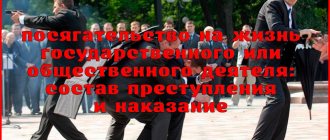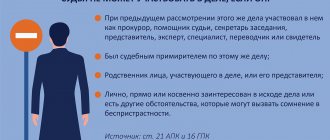New edition of Art. 317 of the Criminal Code of the Russian Federation
Encroachment on the life of a law enforcement officer, military personnel, as well as their relatives in order to impede the legitimate activities of these persons to protect public order and ensure public safety, or out of revenge for such activities -
shall be punishable by imprisonment for a term of twelve to twenty years with restriction of freedom for a term of up to two years, or life imprisonment, or the death penalty.
Responsibility measures
The Criminal Code of the Russian Federation, in relation to crimes related to the utterance or implementation of threats against a law enforcement officer, presents, in general, two articles that should be referenced in order to understand the scope of the possible punishment. These are the articles:
- Article 119, which prescribes punishment in general for uttering threats against one person and members of his family, as well as a group of persons (can be used as a general punishment for uttering threats if there is every reason to fear them in real terms);
- Article 296, which defines the main forms of punishment for uttering threats in connection with the administration of justice or preliminary investigation (applied mainly to protect judges and members of their families, but, in some cases, also against police officers);
- Article 317, which is directly devoted to threats against the life and health of police officers and other law enforcement agencies and punishment for uttering such threats (most often this article is used to impose punishment).
Most often, threats against the life and health of a police officer and his family members are made in connection with the direct performance of his professional activities, as well as as revenge for it (for example, if such threats are made against a retired police officer). Punishment for such a crime is provided for in Article 317 of the Criminal Code of the Russian Federation.
Article 319 of the Criminal Code of the Russian Federation
A public rude statement addressed to a police officer (insult) while he is on duty and performing his duties is a criminal offense.
The danger of this offense is that the culprit infringes on the activities of authorities, their authority, the honor and dignity of the policeman. The Criminal Code of the Russian Federation provides for liability for this in Article 319.
Judicial practice under Article 317 of the Criminal Code of the Russian Federation
“Review of the practice of the Constitutional Court of the Russian Federation for 2017”
Criminal cases charging women with crimes under part four of article 210, part five of article 228.1, part four of article 229.1, articles 277, 295, 317 and 357 of the Criminal Code of the Russian Federation, if judicial hearings on these criminal cases have not been scheduled at the time the Resolution enters into force; they are subject to consideration by the supreme court of the republic, a regional, regional or other court of equal level, and, at the request of the accused, by a court composed of a judge of such a court and a panel of twelve jurors. The jurisdiction and composition of the court in criminal cases, court hearings for which at the specified time have already been scheduled for consideration, are not subject to change, including within the framework and as a result of their consideration in the appeal, cassation and supervisory procedures.
Appeal ruling of the Judicial Collegium for Criminal Cases of the Supreme Court of the Russian Federation dated June 14, 2018 N 78-APU18-10SP
sentenced to imprisonment: under Part 2 of Art. 209 of the Criminal Code of the Russian Federation for 9 years with restriction of freedom for 1 year; according to Part 1 of Art. , paragraphs “a”, “b”, part 4, art. 162 of the Criminal Code of the Russian Federation for 4 years 6 months; according to clause “a”, part 4, art. 162 of the Criminal Code of the Russian Federation (in relation to R.’s property) for 9 years; according to clause “a”, part 4, art. 162 of the Criminal Code of the Russian Federation (in relation to the property of LLC "... ") for 8 years; according to clause “a”, part 4, art. 162 of the Criminal Code of the Russian Federation (in relation to the property of LLC "... ") for 8 years 6 months; according to clause “a”, part 4, art. 162 of the Criminal Code of the Russian Federation (in relation to property in the club on Avenue ...) for 8 years 6 months; according to clause “a”, part 4, art. 162 of the Criminal Code of the Russian Federation (in relation to the property of K. and LLC "... ") for 9 years; according to Part 1 of Art. , clause “a”, part 4, art. 162 of the Criminal Code of the Russian Federation for 4 years 6 months; according to Art. 317 of the Criminal Code of the Russian Federation for 14 years with restriction of freedom for 1 year; according to Part 3 of Art. 222 of the Criminal Code of the Russian Federation for 6 years; on the basis of Part 3 of Art. of the Criminal Code of the Russian Federation for a totality of crimes by partial addition, finally for 16 years in a high-security correctional colony with restriction of freedom for 1 year 6 months, with established restrictions: do not leave your home from 11:00 p.m. until 06:00 next day local time; not to travel outside the territory of the relevant municipality, not to change place of residence without the consent of the specialized state body supervising the serving of sentences by convicts in the form of restriction of freedom, and the obligation to appear twice a month at this body for registration;
Appeal ruling of the Judicial Collegium for Criminal Cases of the Supreme Court of the Russian Federation dated June 20, 2018 N 78-APU18-11
under Article 317 of the Criminal Code of the Russian Federation (for the episode of assault on M.) for 15 years with restriction of freedom for a period of 1 year 6 months; under Part 2 of Article 222.1 of the Criminal Code of the Russian Federation (for the episode dated October 8, 2015) for 4 years;
Appeal ruling of the Judicial Collegium for Criminal Cases of the Supreme Court of the Russian Federation dated July 19, 2018 N 78-APU18-14
convicted under Art. 317 of the Criminal Code of the Russian Federation using Art. of the Criminal Code of the Russian Federation for 8 years of imprisonment with serving the sentence in a maximum security correctional colony. It was decided to recover from Pavel Aleksandrovich Lyapenko 200,000 rubles in compensation for moral damage caused by the crime in favor of Ya.
Appeal ruling of the Judicial Collegium for Criminal Cases of the Supreme Court of the Russian Federation dated August 22, 2018 N 11-APU18-14
according to Art. 317 of the Criminal Code of the Russian Federation for 12 years 6 months of imprisonment in a strict regime correctional colony with restriction of freedom for 1 year, with established restrictions: do not travel outside the relevant municipality, do not change your place of residence or stay without the consent of a specialized state body supervising the detention sentenced to a penalty in the form of restriction of freedom, and the obligation to appear 2 times a month at this body for registration.
Resolution of the Presidium of the Supreme Court of the Russian Federation dated September 12, 2018 N 109P18
convicted: under Art. 317 of the Criminal Code of the Russian Federation to 14 years in prison, under Part 1 of Art. 222 of the Criminal Code of the Russian Federation to 2 years in prison, under Part 1 of Art. 226 of the Criminal Code of the Russian Federation to 3 years in prison, on the basis of Part 3 of Art. of the Criminal Code of the Russian Federation for aggregation of crimes to 15 years of imprisonment in a maximum security correctional colony;
Appeal ruling of the Judicial Collegium for Military Personnel Cases of the Supreme Court of the Russian Federation dated September 20, 2018 N 203-APU18-19
Draws attention to the fact that the illegal actions of persons against the combined police detachment from Bashkiria, who committed a crime on May 9, 2016, were qualified under Art. Art. 317 and 208 of the Criminal Code of the Russian Federation, therefore there are no grounds to accuse him of justifying terrorism. The fact of registering a page on the Internet under the pseudonym “A.” and the presence of telephone numbers ... and ... the first of which has a connection to the network, do not in themselves indicate his involvement in the commission of the incriminated crime.
Appeal ruling of the Judicial Collegium for Criminal Cases of the Supreme Court of the Russian Federation dated September 28, 2018 N 56-APU18-15sp
convicted under Part 1 of Art. 105 of the Criminal Code of the Russian Federation to twelve years of imprisonment with restriction of freedom for a period of one year; according to Part 1 of Art. 222 of the Criminal Code of the Russian Federation, two years of imprisonment; according to Part 1 of Art. 228 of the Criminal Code of the Russian Federation to one year in prison; according to Art. 317 of the Criminal Code of the Russian Federation to eighteen years of imprisonment with restriction of freedom for a period of one year and six months.
Appeal ruling of the Judicial Collegium for Criminal Cases of the Supreme Court of the Russian Federation dated September 25, 2018 N 5-APU18-48
convicted under Part 2 of Art. 162 of the Criminal Code of the Russian Federation to 5 years in prison, under Art. 317 of the Criminal Code of the Russian Federation to 14 years in prison. Based on Part 3 of Art. of the Criminal Code of the Russian Federation on the totality of crimes by partial addition of punishments Gamidzade V.E. sentenced to imprisonment for a term of 15 years to be served in a high-security penal colony.
Appeal ruling of the Judicial Collegium for Criminal Cases of the Supreme Court of the Russian Federation dated October 3, 2018 N 23-APU18-4
according to Art. 317 of the Criminal Code of the Russian Federation (as amended by Federal Law of December 27, 2009 N 377-FZ for a crime committed on October 18, 2016 in relation to D.) for 14 years of imprisonment with restriction of freedom for 1 year 6 months;
Appeal ruling of the Judicial Collegium for Criminal Cases of the Supreme Court of the Russian Federation dated October 25, 2018 N 23-APU18-6
convicted under Part 2 of Art. 209 of the Criminal Code of the Russian Federation (as amended by Federal Law No. 62-FZ of June 13, 1996) for 8 years in prison, on the basis of clause “d”, part 1 of Art. The Criminal Code of the Russian Federation was exempted from serving the sentence due to the expiration of the statute of limitations; according to Art. 317 of the Criminal Code of the Russian Federation (as amended by Federal Law No. 73-FZ of July 21, 2004) for 12 years in prison; on the basis of Part 5 of Art. of the Criminal Code of the Russian Federation for the totality of crimes by partial addition of the punishments imposed under this verdict and the verdict of the Moscow City Court of January 12, 2004, finally to life imprisonment with the sentence served in a special regime correctional colony;
Composition and description of the crime
A person who was 16 years old at the time the crime was committed (the subject of the crime) is subject to liability. As a rule, obscene statements addressed to police officers are always made with direct intent, and the main motives are resentment, revenge, unwillingness to comply with the lawful demands of the police officer and the most common hooliganism. In most cases, people who behave rudely with the police are in a state of drug or alcohol intoxication; there are often situations when insulting law enforcement officers occurs by teenagers who are not aware of their insolence.
- The object of the crime is the authority of state authorities or local administration. An additional object is the honor and dignity of a government representative (in the described case, an employee of the internal affairs bodies).
- The objective side of the crime is humiliation of honor and dignity. In this case, a necessary sign of the objective side is the publicity of the crime.
- The corpus delicti is considered formal. The crime is completed at the moment the offender publicly utters offensive words, regardless of the consequences of the act.
At the same time, publicity, as a mandatory condition, can be expressed not only in verbal utterance of insults in society, but also in the publication of false information in the media, on publicly available resources on the Internet, and print media.
Punishment for insulting a police officer under article
Please note that the sanctions of Art. 319 of the Criminal Code of the Russian Federation can be applied only when an insult is caused while the victim is on duty, or they have a direct connection with his activities (for example, they relate to the conduct of operational activities in a criminal case).
When an insult occurs in conditions not related to work (outside of duty, on vacation or at home), then the actions of the perpetrator will be qualified under Article 130 of the Criminal Code of the Russian Federation or will fall under administrative liability under 5.61 of the Code of Administrative Offenses of the Russian Federation and can be considered in a civil manner.
According to Article 319 of the Criminal Code, for insulting a police officer in a public place, while he is on duty, or in connection with the performance of his official duties, the guilty person may be assigned a significant fine (up to 40 thousand rubles), or from the salary for a period of up to 3 months, corrective labor for a period of up to 1 year, or compulsory work - up to 360 hours.
Beating, attacking a police officer while on duty
In the event of a conflict between a civilian and a law enforcement officer, the fact that the latter is on duty will play a decisive role in classifying the opponent’s actions. With employees of operational and investigative units, the situation is more complicated than with employees with normal working hours. Carrying out the necessary activities is not always possible during “working hours”. Police officers often perform their work at odd hours, while using the powers and protection provided by law.
The Police Law gives law enforcement officers a number of rights, including the use of force. The actions of police officers are strictly regulated and should not pose a threat to the health and life of citizens. Moreover, if the situation requires emergency intervention to save a person’s life, law enforcement officers have the right to act without warning. In regular cases, according to Article 19 of the Law, a police officer during execution is obliged to:
- introduce yourself;
- put forward demands in a clear, correct form;
- give time for execution;
- notify of the possible consequences of non-compliance;
- after this it is possible to use force.
The specifics of service in law enforcement agencies require employees of the Ministry of Internal Affairs to perform duties to protect law and order not only during working hours, but, according to Article 27 of the Law, also during rest periods.
Note! If a law enforcement officer, on his way home, became an eyewitness to a crime or citizens approached him with a request for help or with a statement about a crime being committed, he does not have the right to refuse them.
During the performance of police duties, any opposition from a citizen will be regarded as an offense, and verbal or physical aggression will be considered as threats and an attack on an officer while on duty. If a citizen considers the behavior of law enforcement officers to be incorrect, and the actions and decisions to be unlawful, he should not enter into conflict. You cannot insult a law enforcement officer, touch his uniform or documents, try to hit him, or resist orders. Any of these actions will only make the situation worse. It is better to restrain yourself and remain calm, and then file a complaint against the policeman with his immediate superiors, the prosecutor's office or the court.
In the event that a police officer strictly fulfills departmental rules, actions when arresting or preventing an offense, if property was damaged or a person was injured, the security forces will not be held responsible.
If a police officer is on vacation, taking a break from duty, and the conflict situation that has arisen does not have any signs of wrongdoing, the quarrel between the law enforcement officer and other citizens will be considered as between civilians.
Note! Both parties must take into account the limits of necessary self-defense established by Article 37 of the Criminal Code of the Russian Federation. In the event of a conflict with a police officer who does not comply with departmental standards of conduct, this article gives the citizen the opportunity to avoid prosecution under articles of assault on law enforcement officers.
At the first stage, cases of attacks on law enforcement officials are dealt with by police officers, then the investigation is carried out by the Investigative Committee, an authorized body reporting directly to the President. The investigator collects information on the case: witness statements, documents, photo and video recordings. After which it qualifies the case under a certain article of the Criminal Code of the Russian Federation and transfers it to the court.






